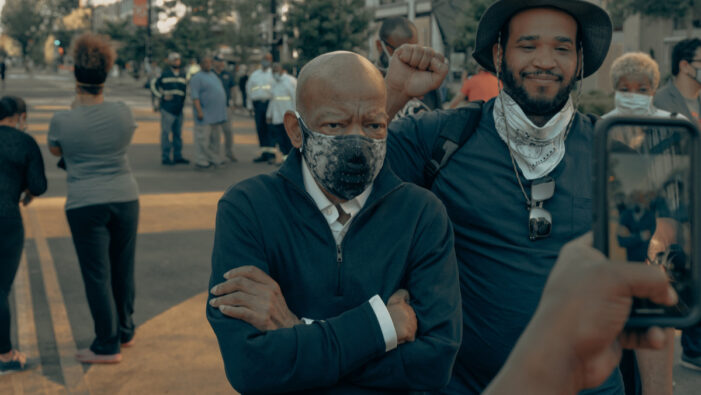Few people that you meet truly rouse the best in you. They are walking heroes, living historymakers. Their words and deeds have a thunderous impact on your soul. Congressman John Robert Lewis was such a person for me. I join the world in mourning the passing of this civil rights legend.
The son of a Sharecropper growing up in rural Alabama, he said as a little boy he was in constant fear because of signs that said “No Colored boys, No Colored girls.” His parents and grandparents used to tell him “Don’t get in trouble.” Nevertheless, as a young man he was inspired to activism by the Montgomery Bus Boycott that started when Rosa Parks refused to give up her seat.
This past December, the Library of Congress opened an extensive exhibition, “Rosa Parks: In Her Own Words,” where the congressman spoke. “Rosa Parks inspired us to get in trouble. And I’ve been getting in trouble ever since,” said Lewis. “She inspired us to find a way, to get in the way, to get in what I call good trouble, necessary trouble.” Over the years, he was able to meet and work with Rosa Parks who taught him about the philosophy and discipline of non-violence. “She kept on saying to each one of us, you too can do something,” he said. “And for people if you see something that is not right, not fair, not just, do something. We cannot afford to be quiet.”
During the exhibition opening, John Lewis told how he was inspired by Rosa Parks to write to Dr. Martin Luther King Jr. He was given a round trip bus ticket to Montgomery to meet with Dr. King and upon meeting him was nicknamed, “The Boy from Troy.”
He risked his life countless times by organizing Voter Registration Drives, Sit-ins at lunch counters and was beaten and arrested for challenging the injustices
of Jim Crow segregation in the South. While still a young man, John Lewis was already a nationally recognized leader and was named one of the Big Six leaders of the Civil Rights Movement. He was also the chairman of the Student Nonviolent Coordinating Committee (SNCC), and his papers and interviews from this time are held at the Library of Congress. At the age of 23, he was a keynote speaker at the historic March on Washington in 1963.
In March 7, 1965, John Lewis led more than 600 peaceful protestors across the Edmund Pettus Bridge in Selma to demonstrate the need for voting rights in the state of Alabama. They were greeted by brutal attacks by Alabama State Troopers that became known as “Bloody Sunday.” This photo from the Library of Library collection is still one of the most powerful images from that day.
Despite numerous arrests and physical injuries, John Lewis remained a devoted advocate of the philosophy of nonviolence. He was elected to the Atlanta City Council and then the representative of Georgia’s Fifth Congressional District. He stuck to Rosa Parks’ advice to never be quiet and to continue getting into “good trouble.”
The congressman was a frequent guest at the Library of Congress. His generous spirit touched everyone he met in the halls of the Library – whether it was reading his graphic novel “March” or speaking at public events – his gentle temperament kept you at ease. His graphic novel allowed him to continue to connect with a new generation of young readers in the hope of inspiring them the way Rosa Parks had inspired him.
In November, John Lewis celebrated the AIDS Memorial Quilt collection arriving at the Library of Congress. His message of peaceful resolve, perseverance and care still rings loud. “In the height of the Civil Rights Movement, we spoke of love,” Lewis said. “On one occasion Dr. King said to some of us, just love everybody. Love them who fail to love you, just love. Just love a little hell out of everybody.”
The world mourns. But we also celebrate a great warrior and fighter of injustice. Let us remember his story and listen to the words he passionately shared for more than a half a century. Congressman John Robert Lewis embodies the best in all of us. Let his legacy and spirit live on. I offer my prayers and condolences to his family and to the grateful people of his district in Georgia.
By: Carla D. Hayden, blogs.loc.gov

